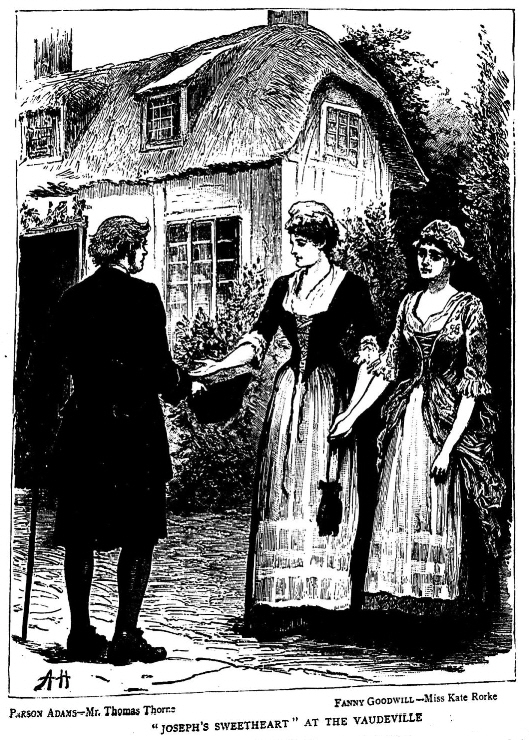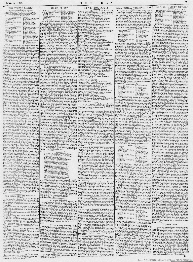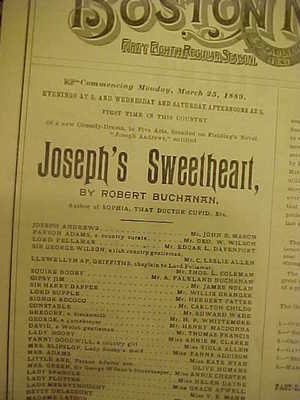|
Play List: 4. Corinne 7. The Mormons 9. Lucy Brandon 10. Storm-Beaten 11. Lady Clare 13. Bachelors 14. Constance 15. Lottie 16. Agnes 17. Alone in London 18. Sophia 19. Fascination 20. The Blue Bells of Scotland 21. Partners 24. Angelina! 25. The Old Home 26. A Man’s Shadow 27. Theodora 29. Clarissa 30. Miss Tomboy 32. Sweet Nancy 33. The English Rose 36. Marmion 37. The Gifted Lady 38. The Trumpet Call 39. Squire Kate 40. The White Rose 42. The Black Domino 44. The Charlatan 45. Dick Sheridan 47. Lady Gladys 48. The Strange Adventures of Miss Brown 49. The Romance of the Shopwalker 52. Two Little Maids from School ___ |
|
ROBERT WILLIAMS BUCHANAN (1841 - 1901) |
|
|
|
|
|
|
|
|
THEATRE REVIEWS 22. Joseph’s Sweetheart (1888) - continued
The Graphic (12 May, 1888) |
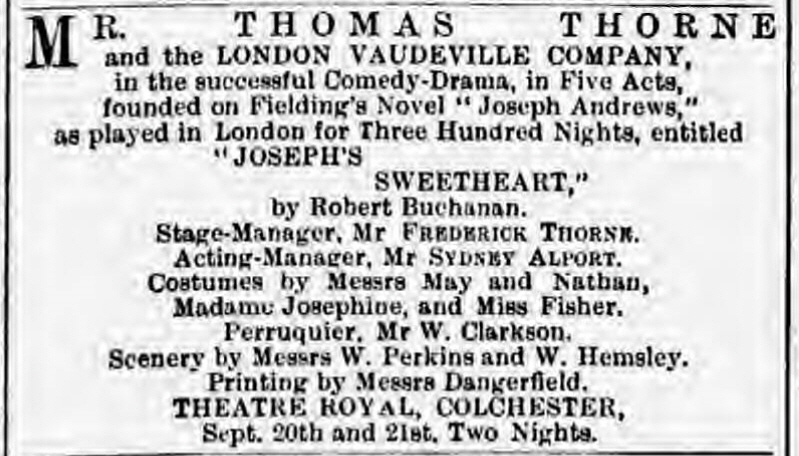 |
|
[From The Era (14 September, 1889 - p.3).]
The Era (12 October, 1889 - p.14) THE BRITANNIA. Joseph Andrews ... ... ... Mr ALGERNOON SYMS A new departure was taken on Monday evening last at the Hoxton home of drama, which was then devoted to the exposition of comedy-drama, the piece chosen being Mr Buchanan’s generally appreciated and laudable adaptation of Fielding’s novel “Joseph Andrews,” which under the title of Joseph’s Sweetheart secured considerable favour at the Vaudeville. The production, we may as well say at once, was highly creditable to Mrs Lane, who delighted her admirers by appearing herself in the rôle of Mrs Slipslop, the ancestress of Mrs Malaprop, a part to which ripe and extensive experience enabled her to do full justice. The “nice derangement of epitaphs” was perhaps scarcely so well understood at the Britannia as at the smaller West-end house; but the Hoxton Britons loyally cheered their popular proprietress, and were evidently much rejoiced to see her on the stage where her chief triumphs have been gained. Mr J. B. Howe, an excellent character actor, in the lighter phases of the part of Parson Adams, was a little too heavy, but he made ample amends by his rendering of the pathetic scenes shared by the benevolent old clergyman. It is necessary to remember that the Britannia is a large house, that conversational tones would scarcely reach the back seats of the gallery, and that, therefore, declamation of a determined kind is necessary if an actor wishes to impress the vast audience that is always present on Monday evening at Mrs Lane’s house. That Mr Howe did impress his hearers was evident enough, and by this time, no doubt, he has got into the skin of his rôle, as our lively Gallic neighbours say, and is all that could be wished in a part that is full of opportunities. Mr Algernon Syms will also be better after a night or two’s acquaintance with Joseph Andrews. He was duly light and playful in his love scenes with Fanny Goodwill, but was a little hard in the interview with Sir George Wilson. Miss Maude Marshall had the distinct advantage of looking the part of Fanny Goodwill to perfection, and her graceful style and clear elocution are also in her favour. Her distress at the conduct of Lord Fellamar might, perhaps, have been more heart-searching and convincing, but she is a winsome young actress, who should rapidly grow in popular favour. Miss Oliph Webb, the Lady Booby, caught the true tone of high comedy in her acting. Her ladyship had quite the necessary distinction of style. Her cutting sarcasms were uttered with an air of good breeding and of familiarity with the etiquette of the society of the period, and the whole rendering proved what a clever and versatile actress Miss Webb is. Mr William Glenny was gay and gallant as Squire Booby, and made good use of his chances in the scene in the third act with Sir George Wilson, carefully played by Mr James Munro. Llewellyn ap Griffith found a melodramatic representative in Mr William Gardiner. Mr Edward Leigh, whose acting is always capable, was sufficiently truculent as Gipsy Jim, and Mr Heinrich W. Varna, whose steady progress in his profession is conspicuous, brought the part of Sir Harry Dapper into agreeable prominence. The surprise of the cast was Mr Walter Steadman’s Lord Fellamar. It was difficult to imagine that this heartless young fop, with an air of gay nonchalance, was played by the same actor who had many a time and oft roused the ire of the gods by dark deeds of stage villainy, committed with frowning brow and vengeful mien. But so it was. Lord Fellamar is about the best thing we have seen Mr Steadman do, and no praise that we could pen would be too high for such a clever grasp of the character. Miss Mary Griffiths did well as the parson’s wife; and Miss Lizzie Howe, Miss Ada Morgan, Miss Kelsey, Miss Pettifer, and Miss Neuman were safe in minor parts. Mr Frank Beaumont, Mr Barrett, Mr Kelsey, and Mr Gregory completed the cast. Those who look upon the Britannia as a theatre famous only for stock melodrama should assuredly visit it during the short run of Joseph’s Sweetheart. To conclude the programme The Phantom Breakfast is played. Selby’s farce is preceded by Sam Redfern’s philosophy and by the leg-mania act of the Ollives and Merry Martell. |
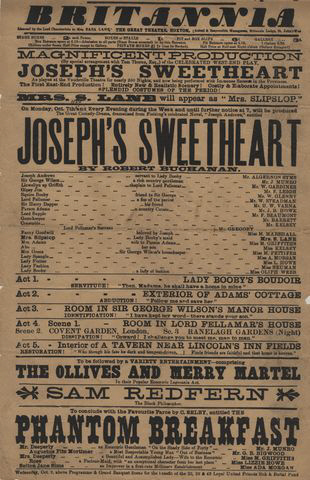 |
|
[Poster for Joseph’s Sweetheart at the Britannia Theatre, Hoxton, 7-12 October, 1889.]
The Edinburgh Evening News (22 October, 1889 - p.2) “JOSEPH’S SWEETHEART” AT THE There is a charming eighteenth-century flavour about “Joseph’s Sweetheart,” presented last night to Theatre-Royal play-goers. The old-fashioned dresses, including periwigs, low obeisances, quaint oaths, and such incidents as the forcible abduction of a humble beauty by a man of fashion, recall the “good old days when George the III. was King,” which one likes to read about, but would not care to see back again. The London of last century had its Ranelagh and Vauxhall; the London of our time insists on having its Aquarium and Trocadero. As presented last night at the Royal, the comedy-drama which Mr Robert Buchanan has founded on Fielding’s novel formed a very enjoyable evening’s entertainment. The plot evolves gradually and naturally, there are several very strong situations, and the piece as a whole has human nature in it, and contrasts very favourably with the inanities and puerilitites to which playgoers are often treated. The Parson Adams of Mr Thomas Thorne is a very clever, capable, and consistent piece of acting. The amiability, eccentricity, and humour of the worthy old curate received full justice from Mr Thorne, even if he has at times a tendency to pander to the “gods” in the direction of farce. As Joseph Andrews, Mr Frank Gillmore showed considerable promise, and acted carefully, and Mr Fred. Thorne made a good deal out of the character of the fiery little Welshman, Llewellyn-ap-Griffiths. The Lady Booby of Miss Gladys Ffolliott was excellent. She portrayed the airs, passion, and hate of the heartless woman of the world with great ability, quietly adding a touch here and a trait there till the character stood out clear and distinct in all its unloveliness. Miss Ella Banister’s Fanny Goodwill while at times fairly good, lacked light and shade. She seemed to be always at high pressure, and this distracted from the effect of her acting when the delineation of strong emotion was needed. A word of praise is due to Miss Sylvia Hodson’s Mrs Slipslop, whose fondness of words she does not understand and cannot pronounce, is worthy of Mrs Malaprop. The other characters were fairly filled. The piece was well-staged, and got a hearty reception from a house, which, considering the disagreeable nature of the evening, was good. ___
The Western Daily Press, Bristol (5 November, 1889 - p.6) THE THEATRES. THE VAUDEVILLE COMPANY AT THE PRINCE’S. Mr Thomas Thorne, supported by the members of his London Vaudeville Company, made his first appearance in Bristol at the Prince’s Theatre last evening in Mr Robert Buchanan’s comedy-drama “Joseph’s Sweetheart,” which has a very successful run of 300 nights at Mr Thorne’s London house, and has been attracting large audiences wherever it has been produced in the provinces. This is the second novel of Fielding’s that has been dramatised by Mr Buchanan. “Sophia” was founded on “Tom Jones,” and “Joseph’s Sweetheart” tells the story of Joseph Andrews, but an author’s note on the play bill when the latter piece was produced at the Vaudeville stated that it was rather a play utilising some of Fielding’s characters than a dramatisation of Fielding’s story. Parson Adams, thanks to Mr Thorne’s admirable impersonation of the good-hearted, self-denying country curate, who, while preaching peace, is nevertheless a member of the church militant, is the central figure of the play; but prominence has been given to the jealous vindictiveness of Lady Booby towards Joseph Andrews and his rustic sweetheart, Fanny Goodwill, whose pure and unselfish love stands out in pleasing contrast to the licentious conduct of the high-born personages who plot to bring about her ruin. The play, which is divided into five acts, has been most skilfully constructed, with the result that the action is brisk throughout, and many of the situations are wonderfully strong. It is mounted with scrupulous care, and eighteenth century dresses are charming examples of the costumier’s art. Readers of Fielding’s novel will not be surprised ton learn that there are features in the play which do not accord with modern tastes and ideas, but the task which Mr Buchanan set himself was a difficult one, and the wonder is that he accomplished it with so much success. Of the manner in which the play was presented by Mr Thorne and the members of his company there could not have been two opinions. Every character was in good hands, and, although Mr Thorne’s own share in the performance stood out with great prominence, the acting all round reached a very high standard of excellence, and called forth frequent outbursts of applause. It is a pity, however, that the language put into the mouth of the titled libertine Lord Fellamar is not shorn of certain coarse expressions, the frequent use of which was certainly not calculated to enhance the enjoyment of the audience. Mr Thorne has studied the character of parson Adams in every detail, and his sketch of the struggling but contented country parson, willing to make any sacrifice to befriend the needy, and having sufficient of the man about him to appreciate what is meant by muscular Christianity, was remarkably clever. Mr Frank Gillmore’s Joseph Andrews was a highly praiseworthy performance; and as the aristocratic villain, Lord Fellamar, Mr Cyril Maude acted with much skill, as did Mr C. Harbury as Sir George Wilson and Mr Stanley Hope as Squire Booby, while Mr Frederick Thorne created considerable amusement out of the role of Llewellyn ap Griffiths, a cruel caricature of a Welsh chaplain. Miss Ella Bannister played Fanny Goodwill with charming naturalness and freshness of style, and Miss Gladys Ffolliott was very effective in the difficult and unenviable part of Lady Booby, whose jealous hatred knows no bounds, and who, after finding that her scheming has failed, and that the happiness of the lovers is assured, declines to accept the inevitable, but continues to give vent to her displeasure down to the fall of the curtain. Miss Sylvia Hodson had an amusing part in Miss Slipslop, whose “connubial declivities” and other Malapropisms created roars of laughter. Miss Coralie Owen was excellent as Mrs Adams, and all the minor parts were, as we have already stated, ably filled. The principal artistes were re-called and heartily applauded at the close of each act, and “Joseph’s Sweetheart” is to be repeated each evening during the week. ___
The Stage (22 November, 1889 - p.9) The Vaudeville re-opens on Thursday next with Joseph’s Sweetheart. On Tuesday next the Vaudeville company will give a performance of Buchanan’s play at the Crystal Palace. ___
The Morning Post (30 November, 1889 - p.5) VAUDEVILLE THEATRE. In reopening the theatre for the season on Thursday evening, Mr. Thomas Thorne was unfortunate in having the rivalry of an important first night at the Garrick Theatre to lure from the Strand many who would gladly have been present to witness once more the admirable acting of the popular lessee in the character of Parson Adams; for Mr. Thorne had not commenced the season with a new piece, “Joseph’s Sweetheart,” which has already enjoyed such a successful run at this theatre, being the attraction. Meanwhile, advantage has been taken of the interval during which the theatre has been closed to redecorate it, and to enliven the stage with a new act drop painted by Mr. Hann, and representing Windsor Castle. It will be remembered that in originally producing his excellent adaptation of the novel “Joseph Andrews,” Mr. Robert Buchanan rationally suggested that it was not necessary in treating these works of a past age in dramatic form to adhere to the custom of the period so closely as to reproduce on the modern stage the coarse language which made the works so objectionable. Adopting this policy, Mr. Buchanan was able to preserve the spirit and character of Fielding’s story, and in “Joseph’s Sweetheart” he has certainly produced a pleasant and genial comedy, the reception of which upon its reappearance on Thursday was gratifying to both author and manager. Mr. Thomas Thorne has seldom had a character that suited him so well, and repeated performances have served to mellow and enrich what was of excellent quality in the first instance. There are evidences throughout of the observant and intelligent study Mr. Thorne has devoted to this character, which stand forth prominently among the stage portraits he has presented. Mr. Frederick Thorne is also to be credited with excellent acting as the Chaplain. He plays the character extremely well, and with plenty of vigour and energy. The brightness of style Mr. Frank Gillmore possesses enables him to do justice to the character of the hero, and Mr. Cyril Maude, a young actor as full of zeal as of intelligence, may always be trusted to give an effective interpretation of the author’s conception. The smaller male parts are well filled, and Miss Ella Bannister makes a very pleasing impression in the part of Fanny, her earnestness and simplicity of style being suitable and appropriate to the character. Miss Sylvia Hodson deserves great commendation for her capital rendering of Mrs. Slipslop. Miss Gladys Ffolliott, Miss Coralie Owen, Miss Rose Dudley, and others efficiently sustained their respective parts, and Master Vivian Deane agreeably played the boy Abe. The representation was in every way creditable to the theatre and performers. ___
The Stage (6 December, 1889 - p.9) Pending the production of Clarissa, Mr. Thomas Thorne has again revived Joseph’s Sweetheart at the Vaudeville, where the new season began on Thursday in last week. The captivating Joseph and the other attractive figures in Robert Buchanan’s admirable play have been closely followed up during their country perambulations in the provincial columns of THE STAGE, and the present exponents criticised at length on more than one occasion. Of the Thursday’s performance, therefore, not much need be said, save to remark that it was difficult to forget the delightful Fanny Goodwill of both Miss Kate Rorke and Miss Winifred Emery, the comely and pleasing Joseph of Mr. H. B. Conway, the Sir George Wilson of Mr. W. Rignold, and the very clever Lady Booby of Miss Vane, belonging to an earlier cast. The impersonations now given in the place of the foregoing ones by Miss Ella Banister, Mr. Frank Gillmore, Mr. C. Harbury, and Miss Gladys Ffolliott, however, have many compensating merits; and with the Messrs. Thorne and the remaining members of the former company co-operating with the newcomers and bringing the advantages of long familiarity to bear upon the characters assumed, a smooth, highly-artistic performance is the natural, as it is the very enjoyable result. Playgoers cannot see Joseph’s Sweetheart too often, and as the present revival is but a brief one, they cannot see it too soon. _____
Next: That Doctor Cupid (1889) Back to the Bibliography or the Plays
|
|
|
|
|
|
|

